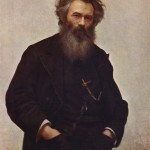(1799-1852) The art of “the genius Karl”, as Bryullov was called by his contemporaries, was marked by virtuosity in brushwork, unusual mastery in drawing and a brilliant knowledge of the laws of composition.
The art of “the genius Karl”, as Bryullov was called by his contemporaries, was marked by virtuosity in brushwork, unusual mastery in drawing and a brilliant knowledge of the laws of composition.
Karl Bryullov was essentially an adherent of the Russian Romantic Movement. Like the French romantic painter Delacroix he often chose as his theme a dramatic historical event.
One of the best known of such works was his “Last Day of Pompeii” (painted in Italy, 1830 — 1833, the Russian Museum in St.Petersburg), with its sharp contrast of the terrifying spectacle of nature’s blind destruction and human nobility.  The masterly execution reflects the excellent training he has received at the Fine Arts Academy in St.Petersburg, whose member he was made and where he was later to teach.
The masterly execution reflects the excellent training he has received at the Fine Arts Academy in St.Petersburg, whose member he was made and where he was later to teach.
The painting was a tremendous success both in Russia and abroad. It was acclaimed by Walter Scott, and the artist was awarded a gold medal at an exhibition at the Louvre in 1834. Bryullov was elected honorary member of the Fine Arts academies of Milan, Bologna, Florence and Parma. At home he was henceforth the recognized coryphaeus of academic painting.
He shared the romantic interest in the East and made a trip around Greece and Turkey in the 1830s. He made some masterly sketches of fighters of the Greek liberation struggle, which served as material for his subsequent large water colour “Sweet Waters Near Constantinople”.
He excelled as a portrait painter. One of his best portraits was painted for a lottery, of which the proceeds were to be devoted to buying a serf pupil his freedom. The pupil was Taras Shevchenko, who was to become the Ukrainian national poet and artist.
In his self-portrait (1848, Tretyakov Gallery, Moscow) he depicts himself ailing physically and morally after an illness which had overtaken him at the height
Vocabulary
genius — гений
contemporary — современник
virtuosity — виртуозность
brushwork — живописная манера
essentially — по существу, в основном
adherent — приверженец
Delacroix — Э Делакруа, французский художник
theme — тема, предмет
“The Last Day of Pompeii” — “Последний день Помпеи” (назв. картины)
blind destruction— слепое разрушение
nobility — благородство
masterly execution — мастерское исполнение
he was later to teach — позже ему предстояло преподавать
to be a tremendous success — иметь огромный успех
to be acclaimed — получить одобрение
honorary — почетный
henceforth — с этих пор, отныне
coryphaeus — корифей
Greece and Turkey — Греция и Турция
subsequent — последующий
water colour — акварель (картина)
to excel as a portrait painter — быть выдающимся портретистом
the proceeds were to be devoted to buying — вырученная сумма предназначалась для выкупа
serf — крепостной
who was to become — кому предстояло стать
Ukrainian — украинский
national — народный, национальный
ailing — хилый, хворый
to overtake (overtook, overtaken) — постигать (о несчастье)
Советы учащимся:
- Не знаешь, как правильно произнести или перевести слово? http://www.lingvo-online.ru/ru- здесь ты сможешь послушать британское и американское произношение слов, а также найти их перевод.
- Не заучивай текст наизусть, попробуй пересказать его!
- Обязательно выучи все незнакомые слова с правильным произношением прежде, чем будешь пересказывать текст!
- Тяжело запомнить весь текст? Составь план текста.





